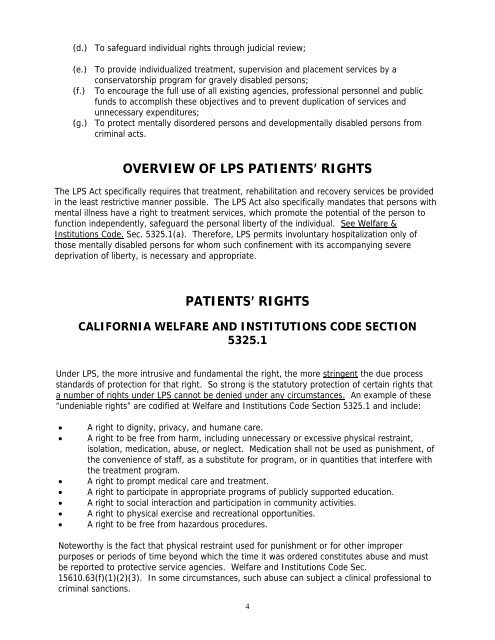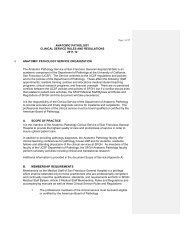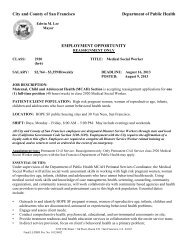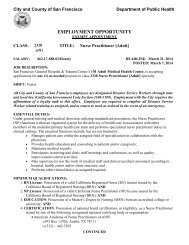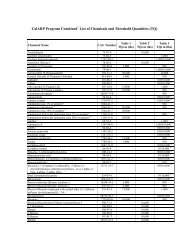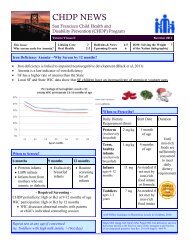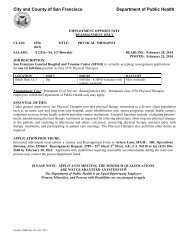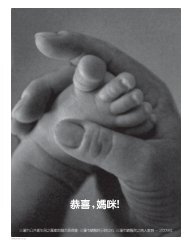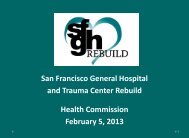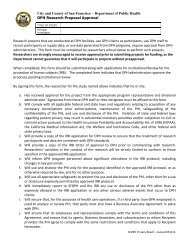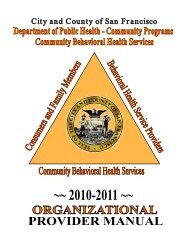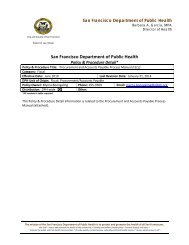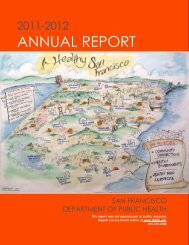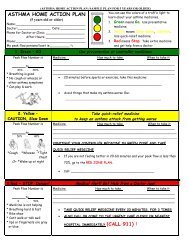5150 Involuntary Detention Training Manual - San Francisco ...
5150 Involuntary Detention Training Manual - San Francisco ...
5150 Involuntary Detention Training Manual - San Francisco ...
You also want an ePaper? Increase the reach of your titles
YUMPU automatically turns print PDFs into web optimized ePapers that Google loves.
(d.) To safeguard individual rights through judicial review;<br />
(e.) To provide individualized treatment, supervision and placement services by a<br />
conservatorship program for gravely disabled persons;<br />
(f.) To encourage the full use of all existing agencies, professional personnel and public<br />
funds to accomplish these objectives and to prevent duplication of services and<br />
unnecessary expenditures;<br />
(g.) To protect mentally disordered persons and developmentally disabled persons from<br />
criminal acts.<br />
OVERVIEW OF LPS PATIENTS’ RIGHTS<br />
The LPS Act specifically requires that treatment, rehabilitation and recovery services be provided<br />
in the least restrictive manner possible. The LPS Act also specifically mandates that persons with<br />
mental illness have a right to treatment services, which promote the potential of the person to<br />
function independently, safeguard the personal liberty of the individual. See Welfare &<br />
Institutions Code. Sec. 5325.1(a). Therefore, LPS permits involuntary hospitalization only of<br />
those mentally disabled persons for whom such confinement with its accompanying severe<br />
deprivation of liberty, is necessary and appropriate.<br />
PATIENTS’ RIGHTS<br />
CALIFORNIA WELFARE AND INSTITUTIONS CODE SECTION<br />
5325.1<br />
Under LPS, the more intrusive and fundamental the right, the more stringent the due process<br />
standards of protection for that right. So strong is the statutory protection of certain rights that<br />
a number of rights under LPS cannot be denied under any circumstances. An example of these<br />
“undeniable rights” are codified at Welfare and Institutions Code Section 5325.1 and include:<br />
• A right to dignity, privacy, and humane care.<br />
• A right to be free from harm, including unnecessary or excessive physical restraint,<br />
isolation, medication, abuse, or neglect. Medication shall not be used as punishment, of<br />
the convenience of staff, as a substitute for program, or in quantities that interfere with<br />
the treatment program.<br />
• A right to prompt medical care and treatment.<br />
• A right to participate in appropriate programs of publicly supported education.<br />
• A right to social interaction and participation in community activities.<br />
• A right to physical exercise and recreational opportunities.<br />
• A right to be free from hazardous procedures.<br />
Noteworthy is the fact that physical restraint used for punishment or for other improper<br />
purposes or periods of time beyond which the time it was ordered constitutes abuse and must<br />
be reported to protective service agencies. Welfare and Institutions Code Sec.<br />
15610.63(f)(1)(2)(3). In some circumstances, such abuse can subject a clinical professional to<br />
criminal sanctions.<br />
4


